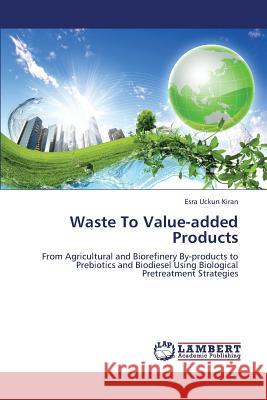Waste to Value-Added Products » książka
Waste to Value-Added Products
ISBN-13: 9783659410543 / Angielski / Miękka / 2013 / 360 str.
Agricultural waste biomass possesses little economical value but due to their lignocellulosic nature they are ideal resources to produce many kinds of value-added products. Different lignocellulosic waste materials are used to produce XOs as they are readily available and having high hemicellulosic content. Xylanase preparations are co-utilized to improve XOs yields. XOs production yield is improved by the co-utilization of different xylans and xylaneses which provide flexibility in the raw material selection for XOs production process. Since other pretreatment methods are neither cost-effective nor environmental friendly, the effects of biological pre-treatments on XOs production are also investigated. In the second part of the study, biodiesel production from main biodiesel by-products is investigated. These by-products are abundant and create disposal problems. They are used in fermentation processes to produce value-added products. They possess good growth and microbial lipid production conditions. The microbial growth and lipid yields improve significantly. The fatty acid compositions of the lipids reveal the great potential of microbial lipids to be biodiesel.
Agricultural waste biomass possesses little economical value but due to their lignocellulosic nature they are ideal resources to produce many kinds of value-added products. Different lignocellulosic waste materials are used to produce XOs as they are readily available and having high hemicellulosic content. Xylanase preparations are co-utilized to improve XOs yields. XOs production yield is improved by the co-utilization of different xylans and xylaneses which provide flexibility in the raw material selection for XOs production process. Since other pretreatment methods are neither cost-effective nor environmental friendly, the effects of biological pre-treatments on XOs production are also investigated. In the second part of the study, biodiesel production from main biodiesel by-products is investigated. These by-products are abundant and create disposal problems. They are used in fermentation processes to produce value-added products. They possess good growth and microbial lipid production conditions. The microbial growth and lipid yields improve significantly. The fatty acid compositions of the lipids reveal the great potential of microbial lipids to be biodiesel.











